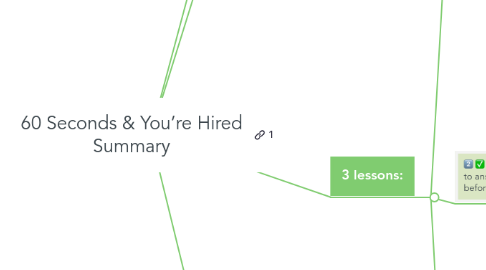
1. 1-Sentence-Summary:
1.1. 60 Seconds & You’re Hired! is a guide to getting your dream job that will help you feel confident in your next interview by teaching you how to impress your interviewer with being concise, focusing on your strengths, and knowing what to do at every step of the process.
2. Favorite quote from the author:
2.1. "You'll never know what you can achieve until you try. Just never, ever give up." - Robin Ryan
3. 3 lessons:
3.1. Help your interviewer remember that you are a good fit by consistently mentioning your top 5 skills throughout the interview.
3.1.1. If you think trying to get the job is hard, just put yourself in the shoes of the person reviewing all the resumes. It’ll be difficult for them to pick you out unless you prepare to do so.
3.1.2. This is where the 5 Point Agenda comes in.
3.1.3. To begin, make a list of your top five most marketable skills.
3.1.3.1. Don’t just list any strengths, focus on those that are specific to the job you’re applying for.
3.1.4. Keep in mind that your list may be different for each job.
3.1.5. Your primary objective is to focus on what you can do that matches the goals of the company.
3.1.5.1. It might be a good idea to look at your potential new employer on LinkedIn and Glassdoor to find out what their values are.
3.1.6. Once you’ve got the list ready, practice so you can highlight all five in less than 60 seconds.
3.1.6.1. Then, in the interview, continually mention each of these strengths so your interviewer remembers them.
3.2. Eradicate fear and boost your confidence to answer questions concisely by preparing beforehand.
3.2.1. The reason this works is because when you’re in the interview you have no surprises. Nothing can catch you off guard if you’ve put in the work to get ready.
3.2.2. First, look for some of the most commonly asked questions in interviews and practice answering them.
3.2.2.1. Role-playing isn’t always fun, but it does make a big difference in your confidence levels every time you do it.
3.2.2.2. Also use your research to think of specific questions the company might ask about their products or services.
3.2.3. Next, remember the details of your best performances at previous workplaces.
3.2.3.1. Again, focus on those that will set you apart to succeed should you be given this new job.
3.2.3.2. The main goal of the employer is to determine if you’re a good fit, and being more specific will help them do that.
3.2.4. Last, get ready to market your specific personality as an ideal worker persona.
3.2.5. You might not think it, but interviewers go in with biases that you have to fight.
3.2.5.1. Millennials, for example, may be thought of as dealing with entitlement and technology addiction.
3.2.5.2. If you’re older, the employer might see you as less innovative.
3.2.6. Highlight your learning and communication skills and success attitude to combat these disadvantages.
3.3. The question “do you have any questions for me?” is a chance to let your true motivations and preparation shine.
3.3.1. Many of us brush this last interview question as non-important. But employers use it as a chance to gain valuable information about your character, so you need to be ready for it.
3.3.2. You’ll also want to use this chance to determine if the job is good for what you want.
3.3.3. To get ready for this opportunity, write a list of 10 to 15 questions that you can take out when they ask if you have any questions.
3.3.3.1. Doing this shows the interviewer your diligence in researching the company and thinking about how you can help it succeed.
3.3.3.2. And if the interviewer answered any of your questions during the interview, be sure to say so.
3.3.4. Never ask about benefits or salary during an interview.
3.3.4.1. Employers use your questions to gauge your intentions. When you ask about money, it shows that you’re more concerned about pay than the actual job.
